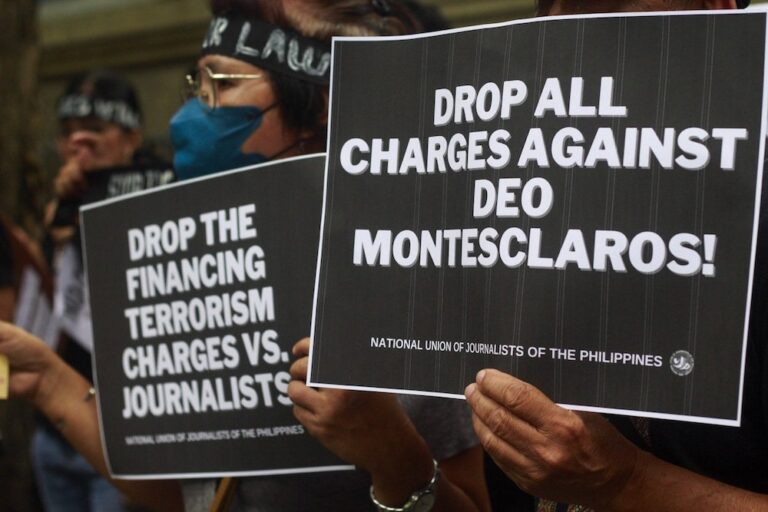(CPJ/IFEX) – The following is an 18 September 2000 CPJ news alert: FRENCH JOURNALISTS VULNERABLE AS PHILIPPINES LAUNCHES MILITARY ASSAULT IN JOLO New York, September 18, 2000—In light of the military offensive launched by the Philippine government on September 16, the Committee to Protect Journalists (CPJ) is deeply concerned about the safety of two French […]
(CPJ/IFEX) – The following is an 18 September 2000 CPJ news alert:
FRENCH JOURNALISTS VULNERABLE AS PHILIPPINES LAUNCHES MILITARY ASSAULT IN JOLO
New York, September 18, 2000—In light of the military offensive launched by the Philippine government on September 16, the Committee to Protect Journalists (CPJ) is deeply concerned about the safety of two French journalists kidnapped by rebels on the southern Philippine island of Jolo.
France 2 television cameraman Jean-Jacques Le Garrec and sound engineer Roland Madura have been held hostage on Jolo since July 9. They are among at least 19 hostages who remain captive on the island.
CPJ is particularly disturbed by comments reportedly made by Philippine president Joseph Estrada on September 15, the night before the assault began, suggesting that his government is not responsible for the fate of hostages who went to Jolo voluntarily. “These people have not been
kidnapped,” said Estrada, according to reports in the Philippine Daily Inquirer and the South China Morning Post. “In the final analysis, our Government is not responsible for their safety, but still we are trying to find a way to get them out.”
Le Garrec and Madura went to Jolo to report on the hostage crisis that began on April 23 with the abduction of 21 people from a Malaysian diving resort by members of the Abu Sayyaf – a loose-knit federation of rebels who claim to be fighting for an independent Islamic state in the southern Philippines. A third member of the France 2 team, reporter Maryse Burgot, was also kidnapped, but she was among a group of hostages released on August 27.
“The France 2 journalists were on Jolo to do their job,” said CPJ executive director Ann Cooper. “The Philippine government is in no way absolved of its responsibility to safeguard their lives, and the lives of all civilians trapped in the fighting.”
CPJ is also disturbed by the military’s imposition of a news blackout on Saturday, which has made it difficult for journalists to get details about the offensive and the fate of the hostages.
France 2’s Manila-based correspondent reported on Saturday, September 16, that Abu Sayyaf leader Galib Andang, known as Commander Robot, had anticipated the attack by the Philippine army and left his camp Friday night, taking the journalists with him. Philippine officials say they believe the hostages are still alive, but fear they may be used as human shields.
Since June 1, fifteen journalists have been kidnapped on the island, with all but Le Garrec and Madura eventually released.
CPJ is a New York-based, nonpartisan, nonprofit organization of journalists that works to promote press freedom around the world. For more information on press conditions in the Philippines visit the CPJ web site at www.cpj.org


